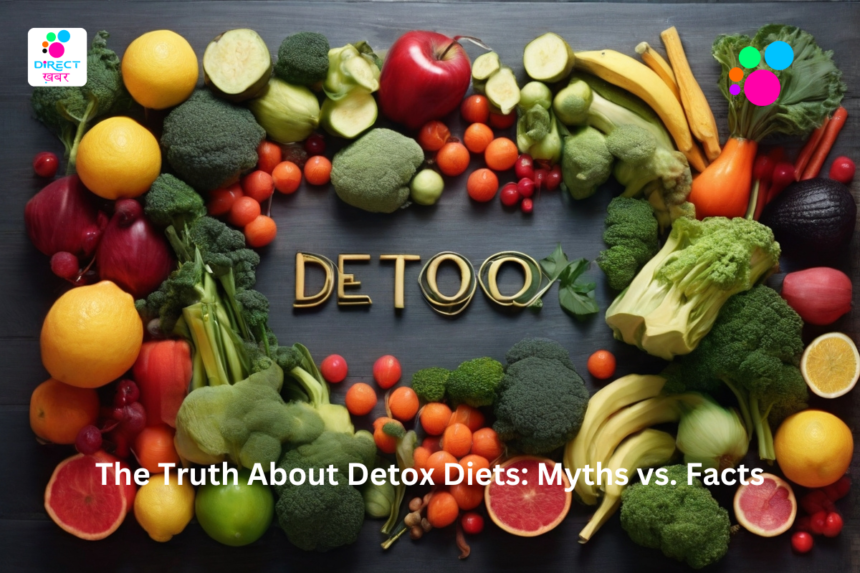The Truth About Detox Diets: Myths vs. Facts
Detox diets have gained popularity in recent years, often touted as a quick fix for weight loss, improved health, and detoxification of the body. However, amidst the hype, there are many misconceptions surrounding these diets. In this comprehensive guide, we’ll explore the reality behind detox diets by debunking common myths and presenting the facts backed by scientific evidence.

Myth 1: Detox Diets Eliminate Toxins from the Body
Fact: Detox diets claim to rid the body of harmful toxins accumulated from processed foods, environmental pollutants, and other sources. However, the body has its own efficient detoxification systems primarily involving the liver, kidneys, and lymphatic system. While certain foods and practices may support these natural processes, there’s limited evidence to suggest that specific detox diets significantly enhance toxin removal.
Myth 2: Detox Diets Lead to Sustainable Weight Loss
Fact: Many detox diets promote rapid weight loss by restricting calories, eliminating certain food groups, or promoting liquid-only consumption. While individuals may experience initial weight loss, much of it is attributed to water weight and muscle loss rather than fat reduction. Moreover, severe calorie restriction can slow down metabolism and lead to weight regain once normal eating habits resume, making detox diets unsustainable for long-term weight management.
Myth 3: Detox Diets Improve Digestive Health
Fact: Proponents of detox diets often claim that these regimens promote digestive health by eliminating “toxic” foods and enhancing nutrient absorption. However, restrictive diets can disrupt the balance of gut bacteria, leading to digestive issues such as bloating, constipation, and nutrient deficiencies. Instead of extreme detox measures, maintaining a balanced diet rich in fiber, probiotics, and whole foods is key to supporting optimal digestive function.

Myth 4: Detox Diets Enhance Energy Levels
Fact: Advocates of detox diets suggest that eliminating processed foods and sugar boosts energy levels and improves mental clarity. While transitioning to a healthier diet may initially result in increased energy due to better nutrient intake, many detox diets are highly restrictive and low in essential nutrients, leading to fatigue, weakness, and mood swings. Sustainable energy levels are best achieved through a well-rounded diet that provides a balance of carbohydrates, proteins, fats, vitamins, and minerals.
Myth 5: Detox Diets Purify the Skin
Fact: Clear skin is often cited as a benefit of detox diets, attributed to the removal of toxins and improved hydration. However, scientific evidence linking detox diets to skin health is limited. While staying hydrated and consuming nutrient-rich foods can support skin health, extreme detox measures may deprive the skin of essential nutrients and lead to dryness, dullness, and breakouts. A holistic approach to skincare involving proper hydration, sun protection, and a balanced diet is more effective in achieving radiant skin.
Myth 6: Detox Diets Improve Overall Health
Fact: Detox diets are marketed as a panacea for various health issues, including inflammation, chronic diseases, and immune system enhancement. However, there’s insufficient scientific evidence to support these claims. In fact, extreme detox measures can compromise immune function, disrupt hormonal balance, and increase the risk of nutritional deficiencies, ultimately compromising overall health. Instead of quick-fix solutions, focusing on long-term lifestyle habits such as regular exercise, stress management, and balanced nutrition is crucial for optimal health and well-being.
Detox diets continue to attract attention with promises of rapid weight loss, improved health, and enhanced well-being. However, separating fact from fiction reveals that many of these claims are unsubstantiated by scientific evidence. While certain detox practices may offer short-term benefits such as increased hydration and nutrient intake, extreme measures can do more harm than good. Instead of resorting to drastic detox diets, adopting a balanced approach to nutrition, hydration, exercise, and stress management is essential for long-term health and vitality.






